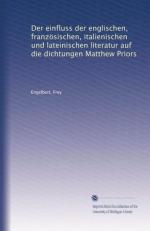|
This section contains 5,397 words (approx. 18 pages at 300 words per page) |

|
"Making 'Intrest and freedom agree': Matthew Prior and the Ethics of Funeral Elegy," in Studies in English Literature 1500-1900, Vol. 29, No. 3, Summer, 1989, pp. 431-45.
In the following essay the critic suggests that Prior's personal and professional values and beliefs made him reluctant to write an elegy on the death of Queen Mary in 1694.
Queen Mary's death in December 1694 called forth the British muse. While the likes of Dennis, Walsh, Stepney, Congreve, and Steele rose—or sank—to the literary occasion, the diplomat and poet Matthew Prior remained conspicuously silent for more than two months after Mary's funeral. As the leading English poet in public life and unofficial "laureate" of William III's reign, Prior experienced pressure to elegize the late queen, and his hesitation is surprising considering his position and taste for occasional verse.1 Although several scholars have remarked upon this episode, its implications for understanding Prior's career as...
|
This section contains 5,397 words (approx. 18 pages at 300 words per page) |

|


